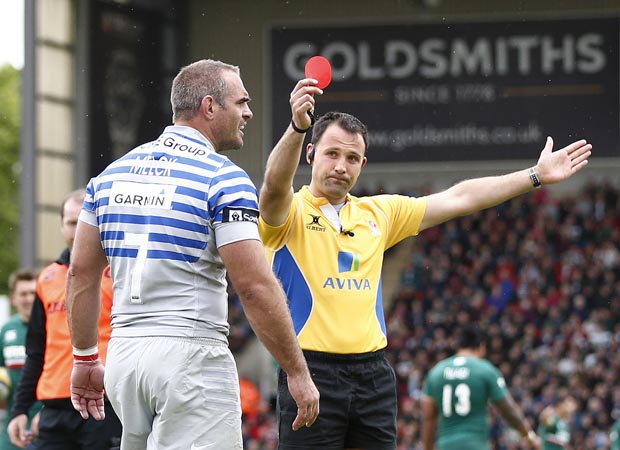 Hard to believe that it is just a week since Leicester's Richard Cockerill called for referees to be less reliant on the TMO and already we have a case where he and Saracens boss Mark McCall are bemoaning the fact the TMO wasn't used.
Hard to believe that it is just a week since Leicester's Richard Cockerill called for referees to be less reliant on the TMO and already we have a case where he and Saracens boss Mark McCall are bemoaning the fact the TMO wasn't used.
Cockerill's call for less use of the TMO was because he felt there had become an over reliance in this technology by match officials, who were seemingly unable to make a decision without referring first to the TMO, despite being full time professionals.
According to Cockerill, the continual delays while every angle is meticulously studied and scrutinised for any small misdemeanors that the referee or his touch judges may have missed are extending the game to such a degree that there is a danger of driving spectators from the stands.
While I agree that there is now too much reliance on the TMO, it is easy to understand why the match officials seem no longer able to trust their own eye or instincts. They are under a constant barrage of criticism from almost every angle as first the coaches and then the media highlight any decisions they think wrong.
With the advantage of frame by frame analysis slowing down play and using computer software to enhance areas of a single frame, it's easy to find mistakes made by a referee watching a fast pace game in real time.
Pointing out when and where a referee has made a mistake seems to be essential for many of TV's ‘experts' in justifying their own views and does little or nothing to help the game. Coaches, on the other hand, seek reasons for losing a match and a ‘mistake' by a match official is as good a reason as any.
Last week's game between Leicester and Sarries had its moment of controversy with the sending-off of Saracens flanker Justin Melck for allegedly making contact with the eye area of Leicester's Neil Briggs.
Referee Greg Garner, on the advice of his touch judge, issued the red card without reference to the TMO to check if the incident took place and has since been on the receiving end of some barbed comments from both coaches.
Cockerill's comment that Briggs has said that the hand just went across the bottom of his face and there was no gouging, beggars the question, why didn't Briggs tell the referee at the time that an incident had not taken place?
I am sure that Melck did not deliberately make contact with the eye area of Briggs but his hand did make contact with Briggs' face. In the event, the red was overturned.
I have sat on many discipline panels that have reviewed similar incidents and it takes a long time, even with specially prepared videos of the incidents to make a decision as to whether an offence has occurred. To expect a TMO to make that call within a reasonable time scale during a game is ludicrous.
Garner, once notified of a potential gouging offence, had no option but to send the player off and rely on a discipline panel to sort out the severity of the incident post match. If he hadn't he would have been crucified should the media have found anything untoward post match.
Referees at the top of the game are paid just like coaches and players and, just like them, if they don't perform they lose their job. So who can blame them for trying to ensure they get it right or at least share the responsibility for any mistake?
If coaches really want the use of the TMO curtailed then they and the TV pundits must agree to stop post-match witch-hunts of referees and live with any mistakes.
Once again, the Premiership seems determined to shoot itself in the foot when it comes to public relations with our Celtic cousins. The PRL have instructed their clubs to refuse to allow the release of Welsh players for a trial match on May 30. The match is a vital part of the preparation for the Welsh tour of South Africa this summer and is a last chance for Warren Gatland and his management team to see the players in action before naming the tour party.
As an Englishman, I am all for disadvantaging Wales when it comes to playing England but against the SANZAR countries it is in our interests to help any and every Northern Hemisphere team to beat them.
The unspoken assertion that SANZAR countries are so much better than anything in the Six Nations is so ingrained in the Northern Hemisphere players that they start every match at a major disadvantage.
I can understand clubs not wanting to release players at the height of the season – but after the club season has ended to stop their release seems churlish. It would seem as if the only reason that PRL enforce this collective agreement is the vast sum of money extracted from the RFU for EPS player release – but this is not the case.
It is a two way street: with the RFU wanting to help their clubs fund pro rugby, they had to come up with a scheme that would allow them to fund the businesses that are the Premiership clubs without falling foul of European competition law. The release payments are part of that scheme.
Government funding is a part of the RFU money and there are strict limits in Europe on how much of that money can be given to sports business. In order for clubs to continue receiving the funding they must strictly enforce the ‘no release policy' or face an even tougher financial time.


























